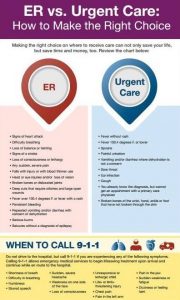ED vs Urgent Care vs PCP
“If I go to a hospital by ambulance, I’ll get seen sooner.”
This is a common misconception that EMS providers often hear, and the answer is “not necessarily”. Hospital Emergency Departments triage patients according to the severity of their symptoms or injuries. Patients with life-threatening conditions such as chest pain, difficulty breathing, stroke symptoms, severe allergic reaction, severe bleeding, or major traumatic injuries (stabbings, gunshot wounds, pedestrian/bicyclist vs. motor vehicle, penetrating chest or head injuries,etc.) will be a priority. Patients with non-life threatening injuries (cuts & scrapes, cold & flu symptoms, fever, nausea, vomiting, diarrhea) may sit in the waiting room for 4-6+ hours before seeing a physician.
Emergency Departments across the country are overcrowded regardless of the day or time, and Rochester area hospitals are no exception.
Be proactive and be prepared!
- During your next visit with your Primary Care Physician, discuss when you should call him/her, or go to an Urgent Care Center, or call 911. Your particular health situation may dictate different criteria than the generalized set below.
- On your refrigerator door, keep a completed EMS Alert Form and the location of your closest Urgent Care Center along with their telephone number, hours of operation, and the services they provide.
If you have any doubt, always call 911. The 911 Dispatchers will not only start emergency first responders to your location, they are also trained to provide you with immediate help. Stay on the phone and remain calm so you can listen to & follow their instructions!
| PCP | Urgent Care | Call 911 |
|
|
|